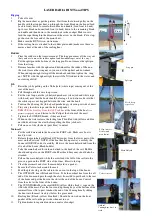
OperatOr SaFety
It is important that only suitably trained personnel operate this equipment. It must also be used in
accordance with the instructions contained in this manual and with proper safety standards
and procedures.
It is imperative that all personnel who may come into contact with our equipment have a
ccess to our
literature
so they can
ensure their safety.
If there is any doubt whatsoever relating to the proper use of this equipment we will be pleased to
assist you.
It is advisable to read the whole of this book before commencing work with the unit.
WarnIng
Poor fluidisation causes hot spots, heater failure, and damage to other parts. Follow instruction book
carefully. For correct fluidisation, pay attention to;
InStallatIOn
Ensure bath is level and air supply is adequate.
OperatIOn
Adjust air valve for even fluidisation.
Do not insert objects larger than recommended.
Ensure objects do not lie in contact with container wall or porous plate.
MaIntenanCe
Regularly inspect and maintain air filter to eliminate oil vapour in air supply.
aluMIna
Should the fluidised bath be stirred for a long period of time under damp or humid conditions, moisture
may be absorbed by the alumina which is hydroscopic. To avoid violent fluidisation which occurs when
damp alumina is heated above 100°C, operate the bath for a period of approximately 8 hours at 90°C
prior to operation at elevated temperatures.
NEVER
ADD
COLD
OR
DAMP
ALUMINA
TO
A
HOT
BATH
AS
THIS
WILL
ALSO
CAUSE
VIOLENT
FLUIDISATION
WHICH
CAN
BE
DANGEROUS.
Allow
the
bath
to
cool
then
add
the
fresh
alumina.
If
this
fresh alumina is a large portion of the charge then dry the whole charge as above.
FuMe eXtraCtIOn
When used for processing items which may emit toxic or inflammable fumes, it is essential that an
adequate fume extraction system be installed. The extraction system must be correctly sized to ensure
that any toxic fumes are removed from the working environment.
To eliminate the risk of spontaneous ignition, the concentration of inflammable fumes above the bath
and within the exhaust duct work must be kept below the lower explosive limit.
7








































